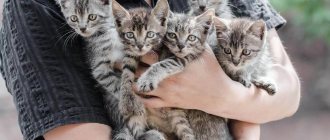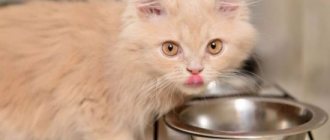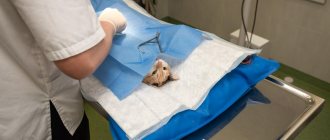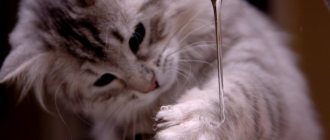Not all cat lovers pay attention to the age at which a kitten is separated from its mother. However, this factor deserves attention. Many people believe that it is better to pick up the baby early in order to promptly accustom him to cat litter, the food that he will constantly eat. But these are misconceptions. There is an optimal age for weaning a kitten from a cat, which ensures smooth adaptation and reduces the risk of various problems. It is worth studying the features of the development and upbringing of children in different periods in order to make the right decision.
Kittens up to a month old
It is strictly not recommended to adopt a kitten that is less than a month old. At this age the pet:
- cannot develop properly without mother's milk;
- needs survival lessons from mom;
- unable to independently understand the environment.
Mother cat, together with breast milk, provides babies with a complete supply of micro- and macroelements necessary for development and strengthening the immune system. No artificial nutrition can be a high-quality replacement for natural food. In addition, kittens that are among brothers and sisters next to their mother receive their first important skills. Before a month, babies do not have time to learn all the necessary lessons. The presence of a cat makes it easier for kittens to get used to the tray and complementary foods.
Oh no I got my kitten when he was only 4 weeks old
Sometimes kittens are adopted by a family at a very young age. Rescued kittens may even be newborns, separated from their mother for unknown reasons. In other cases, irresponsible cat owners who allow the cat to breed may be unaware of proper kitten care and separate them from their mother too early.
If you already have a kitten at such a young age, all you can do is learn about kitten care and try to provide your pet with the appropriate environment and care that it needs.
From the first day of birth, the basis of a kitten’s life is mother’s milk. Until they are three weeks old, kittens' immune systems are unable to produce antibodies (immunoglobulins) that can protect them from infections. But one day, any baby has to grow up and switch to “adult” food. When can a kitten be separated from its mother so as not to cause harm to its health?
The meaning of mother's milk
Milk helps kittens resist pathogens in the youngest period of life - it is very rich in antibodies (provided that the mother cat was vaccinated no more than a year before mating). Thus, mother's milk strengthens the kitten's immunity.
In the first weeks, kittens should have an exclusively dairy diet. On average, a cat feeds its babies 12 times per day. The recommended period of breastfeeding is from one to three months. The completeness of a kitten’s immunity largely depends on how long it has been fed its mother’s milk.
Cat milk replacers
Although the best food for kittens is mother's milk, life sometimes has its own way, and it is not always possible to plan when to tear a kitten away from its mother. It is good if it is possible to place a kitten on another cat that has recently given birth. But the likelihood of this is low, since quickly finding a nursing cat is very difficult. Therefore, the optimal solution in such a situation is a cat milk substitute.
Milk from different animals is approximately the same in composition, but the ratio of components is different. Any milk consists of more than 70% water. But the levels of fat content, proteins and lactose in cat milk are much higher than those of a cow or, for example, a goat.
The fat content of cat's milk is about 11%, while cow's or goat's milk is only about 4%. The protein content is also at least 11%, in the milk of cows and goats – 4%. Lactose content in cat milk is lower and amounts to 3%, while in cow and goat milk this figure is 6%.
All this suggests that milk from other animals is not suitable for feeding kittens. And here a cat’s milk substitute comes to the rescue, the ratio of components in which is carefully verified and as close as possible to real milk.
In addition to fats, proteins and lactose, it contains substances necessary for the normal development of the baby: minerals, vitamins and trace elements. The substitute contains taurine, an amino acid that is very important for the health of cats, as well as Omega-6 and Omega-3 fatty acids. The lack of these substances for a kitten’s rapidly growing body threatens the development of various pathologies.
You will learn how and in what proportions to dilute the dry substitute mixture from the preparation instructions on the package.
At what age are kittens weaned from their mother?
You definitely shouldn’t separate your baby from his mother until he is 1.5-2 months old. After all, it is by this age that the mother cat will teach the kitten to eat on its own, wash itself properly and go to the toilet.
Like people, in cats the behavior of babies directly depends on the level of “culture” of the parents, primarily the mother cat. It is she who is responsible for the socialization of the kitten in the first stages of its development
And this is extremely important, because it is at this time that the kitten’s character and behavioral model are formed.
When kittens are separated from their mother too early, they can grow up to be aggressive, distrustful and overly impulsive. Often, having not received the necessary “lessons” from their mother, they reluctantly accept the love of their owners and avoid playing with them. In a word, they grow up uncommunicative and withdrawn. Only your love, affection and patience can change this state of affairs.
To ensure that the new inhabitant of your home grows up mentally balanced and physically healthy, find out how and when you can take a kitten from its mother and get recommendations on how to
Kittens under two months of age
There is no need to rush to take home a baby at the age of 1-2 months. This is not the best time to part with your cat. In the period up to 2 months, kittens acquire important skills. A well-mannered mother teaches her kids:
- use a scratching post rather than upholstered furniture;
- go to the litter box;
- use claws and teeth for their intended purpose;
- eat complementary foods;
- Follow cat hygiene rules.
It may seem that the owners can teach all this. But experts rightfully claim that cats are much better at this upbringing. The kitten learns all these rules without stress and learns them better.
There are also anatomical features that prevent kittens from being weaned at the age of 2 months. At this time, babies are vaccinated to build immunity. But the protective system does not strengthen immediately. This requires 2-3 weeks. The process is faster and better if the kitten is with its mother and receives an additional supply of antibodies with her milk.
What should a kitten be able to do by the time it starts living independently in a new home?
When the time comes and the kitten needs to move to a new home, he must be completely independent of his mother and have certain skills. This means that during the period of independent life, by twelve weeks, the kitten must be trained to use a tray and a scratching post. Also, to avoid problems with feeding, he should switch from milk to solid food.
When accustoming a kitten to food, you can use the following method. Place a bowl of food in front of the baby and dip his face into it. When the kitten gets a taste, he will begin to eat on his own.
The kitten usually learns how to go to the toilet using the litter box by watching the mother cat. At first he may just play with the filler, but later he understands its purpose. The main thing is not to place the tray far from the kittens’ habitat; they are still too small and will not be able to tolerate it for long.
A cat mother can teach a baby to use the litter box
I also start using a scratching post for kittens following the example of their mother. To attract their attention, you can hang up more toys or spray them with catnip-scented spray.
It is also important for kittens to gain social skills, such as human contact. From the first days of life, the kitten must be held for at least 10-15 minutes a day. They are also useful to play with, pet and talk to.
It’s good when a kitten can calmly relate to procedures such as bathing, brushing, examining teeth and trimming claws. Babies should be allowed to interact with different people and animals, as well as explore new sounds and smells.
Optimal age: three months
Most experts agree that the best time to wean a cat is three months. There are good reasons for this assertion. By this time, the kitten has developed a strong immune system and has certain skills. Three month old babies:
- have social skills and easily get used to strangers;
- know how to eat solid food and drink independently;
- Carefully lick the fur and wash.
At this age, it is not difficult to instill in a kitten the rules of cat etiquette. Mom has already taught him to go to the litter box, all that remains is to show him where he is. The baby will quickly master the scratching post if the cat has used such a device. An important advantage is the high-quality functioning of the digestive system, which already digests solid food.
By this age, the kitten’s immunity is fully formed. In addition, he has already received the first vaccinations against rhinotracheitis, chlamydia, calcivirosis, rabies, panleukopenia, and has been treated for helminths. Consequently, the new owner will not have problems, and the risk of the baby getting sick is minimal.
How to give away a kitten correctly
Before giving a kitten to a new owner, you need to ask whether the future owner has everything necessary. The baby will need:
- A place to sleep is a sun lounger. It is better to place the kitten in a box, covering it with woolen cloth. For older cats, a bed with low sides will be suitable. Some pets choose their own resting place, so if it is safe there, you can leave it there;
- Tray. If the baby is less than 5 weeks old, you need a basin with low sides. It is better to choose a regular plastic tray; closed toilets are not suitable for babies. Wood or corn filler is suitable;
- Bowl and drinking bowl. It is better to choose ceramic or plastic. Metallic ones can oxidize food and water;
- Scratching post. When your baby first appears indoors, you should show him where he will sharpen his claws. You can make a scratching post yourself from a piece of an old rug and hang it on the wall, decorating it with movable soft pet toys;
- Carrying for trips to the veterinarian.
The new owner needs to be told about the food the kitten receives and the type of filler in the tray that the baby is used to. The buyer should also be made aware of the vaccinations they have received. You can inform about the habits and character traits of the baby. It is necessary to tell about the rules of caring for the kitten, hand over the birth certificate and veterinary passport, if any.
The new home for the kitten should be ready to welcome the baby
All these actions will help not only the kitten, but also the new owner, to quickly get used to each other and become best friends.
Negative psychological factors of early weaning
According to statistics, in 80 cases out of 100, when adopting a kitten before three months of age, minor and medium-sized problems arise. In the remaining 20 babies they had a serious form. More than a third of pets separated from their mother too early acquire the habit of sucking on pillows, soft toys, and blankets. 40% of kittens have an aggressive attitude towards people. Many babies, separated from their mother before 2 months, are too timid, afraid of sounds, strangers, and do not adapt well to a new environment. Such pets often exhibit psychoneurotic dysfunctions.
Up to 3 months, kittens undergo the formation of their main organs and systems; during this period they receive the main lessons from the cat, learn to contact the external environment and people. A pet that has not gone through this important period in a familiar society with its mother, sisters, and brothers often:
- does not comply with the rules of cat hygiene;
- difficult to switch to regular diet;
- He is disobedient and poorly trained in the litter box.
A serious problem is the psychological stress experienced by children who have not undergone social adaptation next to their mother. They are hit by several negative factors at the same time. They are deprived of the guarantees of safety that a cat provides, they are surrounded by foreign objects, smells, sounds, they do not know how to properly explore this area and look for a reliable shelter. No matter how caring the owner is, he will not be able to explain all these wisdom to the kitten the way a mother would.
How long after can I take kittens away from my cat? What if earlier?
Yes, ideally they should be 12-16 weeks old . This is the age range where kittens have had enough time to learn how to behave, but are still young and flexible enough to quickly adapt to a new home. If for some reason you can't wait until the kittens are 12 weeks old, at least try to keep them with their mom until they are confident eating solid food (usually at least 8 weeks old). If you can delay their separation from the cat family, any extra day you give them will benefit their mental and social development.
By the way, you can read how to feed small kittens here.
Possible health problems
Significant problems can also arise with the health of a pet that is separated from the cat for up to three months. During this period, the most important processes in the formation of organs and systems take place. The presence of breast milk eliminates the deficiency of essential minerals, vitamins, and other microelements. This allows the digestive system to establish the production of enzymes necessary for food processing, gradually, in a normal manner. A kitten that begins to eat regular food before the age of three months may experience various disruptions in the gastrointestinal tract. This often becomes the cause of chronic diseases.
It is known that cats have good health; their bodies cope with many diseases on their own, without medical help. These qualities are ensured by the strong immunity that nature provides to animals. The body of a newborn kitten is practically deprived of this natural defense and cannot produce antibodies to fight pathogenic microbes and bacteria. They come to babies from mother's milk. If kittens are deprived of this source too early, immunity does not have time to form and strengthen. Consequently, a favorable environment is created for the development of infections and inflammations.
Veterinary pharmacology includes vaccinations to strengthen the natural defense system. But they can only be done at 2 months. After this, the kitten remains defenseless against these aggressors for some time; it still requires help in the form of mother's milk. Therefore, babies who were taken before three months often get sick.
Features of newborn kittens
Immediately after birth, the cat releases the babies from the amniotic sac, which allows the kitten to take its first breath. The babies are wet at this time, the mother licks them and later pushes them towards the nipples. Main features of babies:
- Dream. During the first and second weeks, kittens eat and sleep most of their lives. During sleep, the baby may shudder, move his paws, and smack his lips. This indicates the active phase of sleep and is normal. For the first 2 days, cats sleep with their heads tilted towards their chest.
- Weight. Normal full-fledged babies weigh 70-130 g, gradually gaining weight.
- Vision and hearing. Kittens are born blind with closed eyes, which should open in 1-2 weeks. During this period, the cubs begin to hear.
- Touch and smell. Developed because the kitten smells milk, so it approaches the cat’s belly and grabs the nipple.
- Sucking reflex. Very developed. If a kitten is taken away early, the instinct remains for a long time, even when the baby grows into an adult cat and sucks the owner's hand.
- Defecation. The kitten does not yet know how to go to the toilet on its own, so the cat must stimulate the tummy by licking it in the genital area. At 1 month, the baby can already go to the tray on his own, which his mother teaches him to use.
- Leather and wool. Always clean and well-groomed, the skin is light pink and elastic.
- Behavior. The older the kitten gets, the more intensely it moves and shows curiosity, getting out of the box or basket. Therefore, inactive babies may be sick, and in a Scotsman or Briton this indicates osteochondrodysplasia.
Anti-worming medications for kittens: at what age are kittens dewormed?
Anti-worm medications for kittens
Worms for animals cause many problems with health and well-being. Therefore, they need to be removed in a timely manner, and it is better to do prevention. At what age are kittens dewormed? Answer:
- You can fight helminths as early as three weeks of age.
- However, drugs must be labeled accordingly. If there is no inscription “for kittens” , then this product can only be used at one and a half to two months.
- Kittens should not be wormed often - once every three months will be enough.
The most popular medications for kittens against worms:
- Tablets: Milbemax, Drontal, Prazitel, Dirofen. Despite the fact that the tablet form is more difficult for animals to consume. Veterinarians recommend it, since the tablets contain a higher concentration of active substances. You can crush the tablet and put the powder in the kitten's food or directly in the mouth. But then you need to give it a drink, for example, from a syringe without a needle.
- Suspension : Prasitel, Prazicide, Dirofen and Febtal combo. Convenient form for reception. In liquid form, you can give the product using a special dispenser, which is included in the package, or using the same syringe without a needle.
- Drops : Drontsit, Profender, Stronghold, Prazicide. Used as a preventive measure.
It is important to consider: How often does your kitten go outside (and whether it does), how often does it communicate with other animals. If your pet is always at home and there are no other animals in the apartment, deworming can be done less often.
Food products are also taken into account. In some cases, deworming medication is used more often than once every 3-4 months, if the animal eats offal, raw minced meat, etc. But a kitten can become infected with worms even before birth - from its mother cat. The drug should be chosen according to age and weight. As a rule, most products are available in both an “adult” version and a “children’s” version (for kittens).
Advice: Give preference to natural preparations.











